



ABOUT
ENJAYMO
ENJAYMO is a chemotherapy-free treatment option for hemolysis in Cold Agglutinin Disease (CAD)
What happens in people living with Cold Agglutinin Disease
- When you have Cold Agglutinin Disease, your immune system makes cold agglutinin antibodies that mistake your red blood cells as a threat to the body.
- When antibodies attach to red blood cells, they cause them to clump together, forming a complex.
- A protein group called C1 binds to the complex, which results in the activation of the classical complement pathway. This leads to the destruction of the red blood cells in a process called hemolysis.
- If your body destroys red blood cells faster than it can replace them, you may develop anemia. When you have Cold Agglutinin Disease (CAD), you may experience chronic hemolysis, which if ongoing can lead to chronic anemia.


How ENJAYMO works
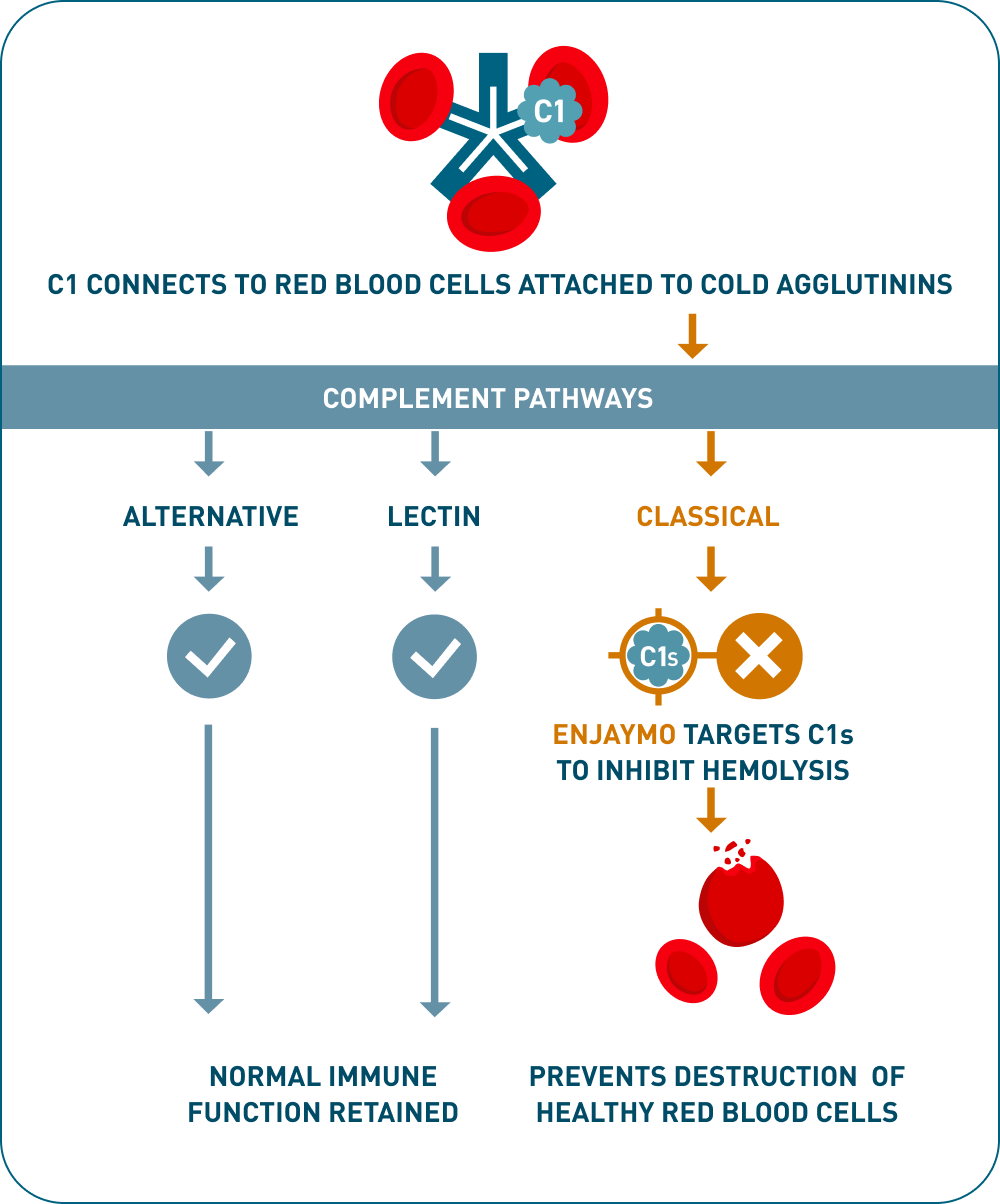
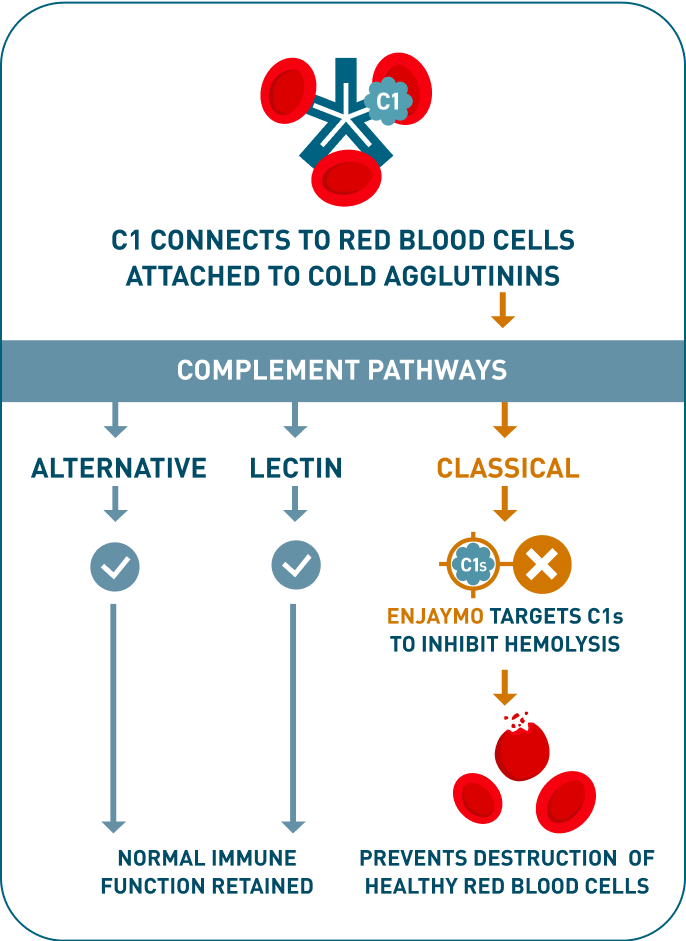
ENJAYMO does not affect the immune functions of the lectin and alternative pathways
 ENJAYMO is designed to help inhibit hemolysis—the destruction of red blood cells—before it starts
ENJAYMO is designed to help inhibit hemolysis—the destruction of red blood cells—before it starts It does this by selectively targeting and binding to the C1s protein, a key protein in the classical complement pathway
It does this by selectively targeting and binding to the C1s protein, a key protein in the classical complement pathway The classical complement pathway is responsible for hemolysis in Cold Agglutinin Disease
The classical complement pathway is responsible for hemolysis in Cold Agglutinin Disease By binding to the C1s protein, ENJAYMO blocks the classical complement pathway and helps inhibit the chain reaction at the very beginning, reducing the destruction and removal of healthy red blood cells by the immune system
By binding to the C1s protein, ENJAYMO blocks the classical complement pathway and helps inhibit the chain reaction at the very beginning, reducing the destruction and removal of healthy red blood cells by the immune system While it inhibits the classical complement pathway, ENJAYMO leaves the other complement pathways (lectin and alternative pathways) alone to carry out their immune functions
While it inhibits the classical complement pathway, ENJAYMO leaves the other complement pathways (lectin and alternative pathways) alone to carry out their immune functions


Study results
ENJAYMO is a chemotherapy-free treatment that helps to address the impact of Cold Agglutinin Disease.
The safety and efficacy of ENJAYMO were evaluated in two clinical trials. One clinical trial was a placebo-controlled clinical trial in 42 patients with Cold Agglutinin Disease who did not have a history of blood transfusion in the last 6 months.
Placebo=a harmless medicine with no therapeutic effect, used as a control in testing new drugs.73% (16/22) of patients responded to treatment with ENJAYMO vs 15% (3/20) on placebo


Within a short time of starting ENJAYMO, I noticed my hemoglobin improving. My hemoglobin has stayed stable since then. I feel less fatigue, and I can enjoy walking the golf course without tiring so easily.
—LYNN, LIVING WITH COLD AGGLUTININ DISEASE (CAD)This is one patient’s experience; individual results will vary.
ENJAYMO offered fast and lasting improvement of hemoglobin levels during the study*
See the difference ENJAYMO makes in helping raise hemoglobin levels, compared with placebo.
Placebo=a harmless medicine with no therapeutic effect, used as a control in testing new drugs.In Part A: patients received either ENJAYMO or placebo for 26 weeks (6 months)
In Part B: the placebo patients were switched to ENJAYMO from Week 27 up to one year, and all patients continued on ENJAYMO until the end of the trial

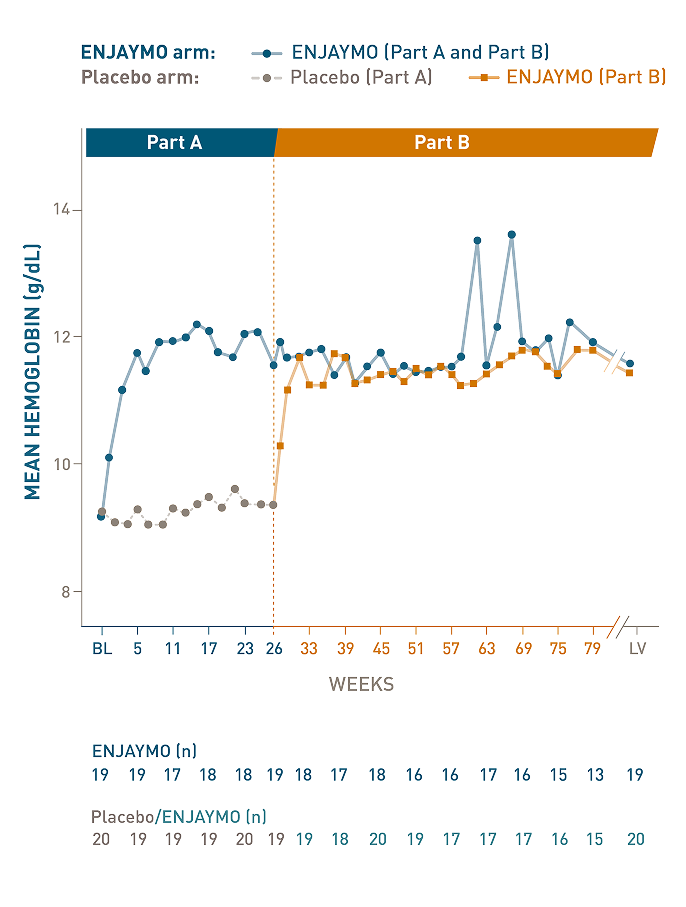 (n)=number of patients tested on ENJAYMO, and placebo/ENJAYMO.
(n)=number of patients tested on ENJAYMO, and placebo/ENJAYMO.
Average increase in hemoglobin


This graph shows the average change in hemoglobin levels from the start of the study to the end of the study.
 The blue line shows the change in hemoglobin for people who received ENJAYMO in parts A and B
The blue line shows the change in hemoglobin for people who received ENJAYMO in parts A and B The gray line shows the change in hemoglobin for those who received placebo in part A
The gray line shows the change in hemoglobin for those who received placebo in part A The orange line shows the change in hemoglobin for those who received placebo in part A and switched to ENJAYMO in part B
The orange line shows the change in hemoglobin for those who received placebo in part A and switched to ENJAYMO in part B Please consider these results with caution as only the average values from Weeks 23, 25, and 26 were chosen for testing if the treatment works
Please consider these results with caution as only the average values from Weeks 23, 25, and 26 were chosen for testing if the treatment works
The average hemoglobin level at the start of the study was 9.15 g/dL for patients on ENJAYMO and 9.33 g/dL for patients on placebo.
*This was a 26-week randomized, placebo-controlled, Phase 3 trial where 22 patients diagnosed with Cold Agglutinin Disease received ENJAYMO and 20 patients received placebo. The primary endpoint was hemoglobin increase, transfusion independence, and use of other Cold Agglutinin Disease treatment. 39 patients continued to receive ENJAYMO in a long-term safety and durability of response extension phase (part B).Significant improvement in fatigue
The FACIT-Fatigue questionnaire has 13 items, each scored from 0 ("not at all") to 4 ("very much"). The scores are calculated so that the higher scores indicate less fatigue experienced.
This 13-item survey (FACIT-Fatigue) included questions about:
- How fatigued they felt
- How weak and tired they felt
- Ability to perform usual activities
- Need to take a nap to get through the day
- Frustration because of tiredness
FACIT-Fatigue is measured on a scale of 0 (most fatigue) to 52 (no fatigue). The higher the score, the less fatigue the patient experienced.
In the clinical trial, patients on ENJAYMO had an average 11-point improvement from baseline (improving from an average baseline score of 31.67 points to an average score at treatment assessment of 42.5 points) vs a 2-point improvement in patients on placebo. Higher scores on the survey meant a person felt less fatigue.
Impact on fatigue as measured by FACIT-Fatigue survey
Patients received either ENJAYMO or placebo for 26 weeks

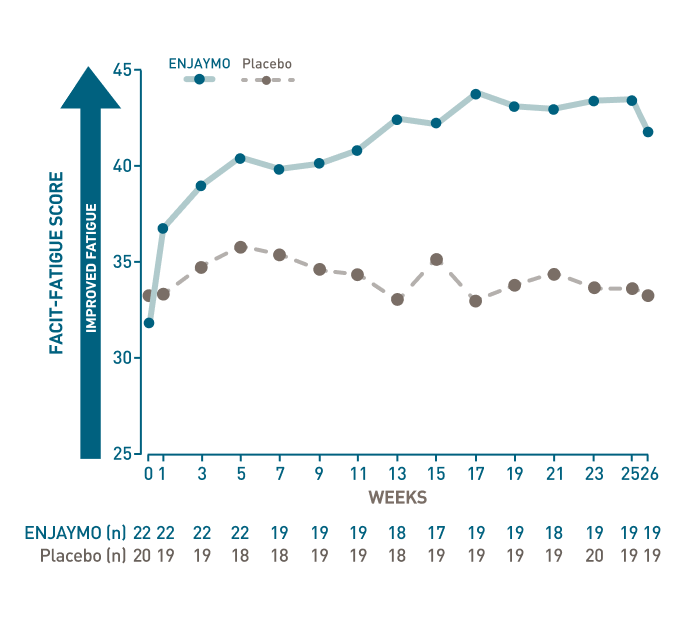 (n)=number of patients tested on ENJAYMO, and placebo/ENJAYMO.
(n)=number of patients tested on ENJAYMO, and placebo/ENJAYMO.
Part A: at Week 26
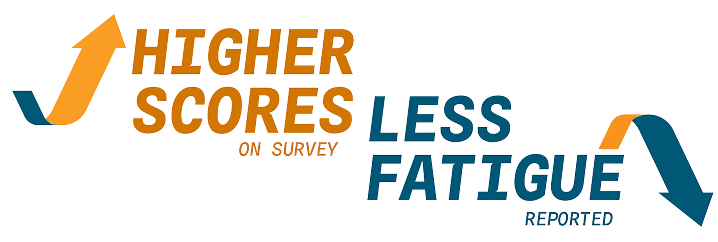
 The blue line shows the impact on fatigue for people who received ENJAYMO
The blue line shows the impact on fatigue for people who received ENJAYMO The gray line shows impact on fatigue for those who received placebo in part A
The gray line shows impact on fatigue for those who received placebo in part A Please consider these results with caution as only the average values from Weeks 23, 25, and 26 were chosen for testing if the treatment works
Please consider these results with caution as only the average values from Weeks 23, 25, and 26 were chosen for testing if the treatment works


The safety and side effects of ENJAYMO
What is the most important information I should know about ENJAYMO?
 ENJAYMO is a medicine that affects your immune system
ENJAYMO is a medicine that affects your immune system ENJAYMO may lower the ability of your immune system to fight infections
ENJAYMO may lower the ability of your immune system to fight infections-
 ENJAYMO increases your chance of getting serious infections, including those caused by encapsulated bacteria
ENJAYMO increases your chance of getting serious infections, including those caused by encapsulated bacteria
- You must complete or be up to date with the vaccines against Streptococcus pneumoniae and Neisseria meningitidis at least 2 weeks before your first dose of ENJAYMO.
- If your healthcare provider decides that urgent treatment with ENJAYMO is needed, you should receive vaccinations as soon as possible.
- If you have been vaccinated against these bacteria in the past, you might need additional vaccines before starting ENJAYMO. Your healthcare provider will decide if you need additional vaccines.
- Vaccines do not prevent all infections caused by encapsulated bacteria. Call your healthcare provider or get emergency medical care right away if you get any of these signs and symptoms of a serious infection:
-
 ENJAYMO can cause serious side effects, including infusion-related reactions and risk of autoimmune disease
ENJAYMO can cause serious side effects, including infusion-related reactions and risk of autoimmune disease
The most common side effects of ENJAYMO include:
- increase in blood pressure
- urinary tract infection
- respiratory tract infection
- bacterial infection
- swelling in lower legs or hands
- joint pain
- headache
- nausea
- runny nose
- bluish color to the lips and skin
- dizziness
- feeling tired or weak
- cough
- changes in color or sensation in the fingers and toes (Raynaud’s phenomenon)
These are not all the possible side effects of ENJAYMO.
You should tell your doctor about any side effect that bothers you or does not go away. There are other possible side effects of ENJAYMO. For more information, ask your doctor or pharmacist.


Safety was evaluated in two Phase 3 clinical trials
In CADENZA (Part A), participants with Cold Agglutinin Disease with no history of blood transfusion during the 6 months prior to starting the study were randomly selected to receive either ENJAYMO (n=22) or placebo (n=20), and neither they nor their doctor knew which one they were given (double-blind).
 Serious adverse reactions occurred in 2/22 (9%) patients who received ENJAYMO. Serious adverse reactions included Raynaud’s phenomenon (n=1) and febrile infection (n=1)
Serious adverse reactions occurred in 2/22 (9%) patients who received ENJAYMO. Serious adverse reactions included Raynaud’s phenomenon (n=1) and febrile infection (n=1) Permanent discontinuation of ENJAYMO due to an adverse reaction occurred in 2/22 (9%) patients. Adverse reactions which resulted in permanent discontinuation of ENJAYMO included Raynaud’s phenomenon (n=1), acrocyanosis (n=1), and infusion-related reactions (n=1)
Permanent discontinuation of ENJAYMO due to an adverse reaction occurred in 2/22 (9%) patients. Adverse reactions which resulted in permanent discontinuation of ENJAYMO included Raynaud’s phenomenon (n=1), acrocyanosis (n=1), and infusion-related reactions (n=1)
The most common side effects (≥18%) reported were:
- runny nose
- headache
- increase in blood pressure
- bluish color to the lips and skin
- changes in color or sensation in the fingers and toes (Raynaud’s phenomenon)
In CARDINAL, 24 participants with Cold Agglutinin Disease with at least 1 blood transfusion during the 6 months prior to starting treatment received ENJAYMO—and were told what drug they were given (single-arm).
 Serious adverse reactions occurred in 10/24 (42%) patients who received ENJAYMO. The most common serious adverse reaction (>5%) was bluish color to the lips and skin. One person who received ENJAYMO died from a bacterial infection reaction
Serious adverse reactions occurred in 10/24 (42%) patients who received ENJAYMO. The most common serious adverse reaction (>5%) was bluish color to the lips and skin. One person who received ENJAYMO died from a bacterial infection reaction Permanent discontinuation of ENJAYMO due to an adverse reaction occurred in 2/24 (8%) patients. Adverse reactions which resulted in permanent discontinuation of ENJAYMO included pneumonia klebsiella (n=1) and acrocyanosis (n=2)
Permanent discontinuation of ENJAYMO due to an adverse reaction occurred in 2/24 (8%) patients. Adverse reactions which resulted in permanent discontinuation of ENJAYMO included pneumonia klebsiella (n=1) and acrocyanosis (n=2)
The most common side effects (≥25%) reported were:
- urinary tract infection
- respiratory tract infection
- bacterial infection
- dizziness
- feeling tired or weak
- swelling in lower legs or hands
- joint pain
- cough
- increase in blood pressure
- nausea



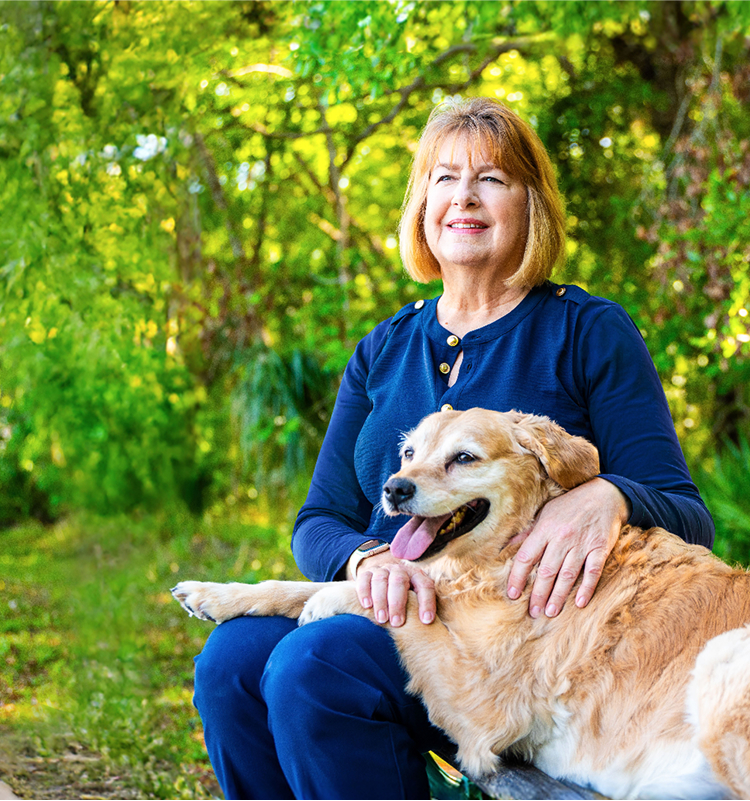
Want to talk to someone about ENJAYMO?
If you have questions, our patient support program puts eligible patients in touch with Case Managers for information about financial assistance, information about Cold Agglutinin Disease or ENJAYMO, and more.

What is ENJAYMO?
ENJAYMO® is a prescription medicine used to treat the breakdown of red blood cells (hemolysis) in adults with cold agglutinin disease (CAD).
It is not known if ENJAYMO is safe and effective in children.
IMPORTANT SAFETY INFORMATION
Do not receive ENJAYMO if you are allergic to sutimlimab-jome or any of the ingredients in ENJAYMO.
ENJAYMO can cause serious side effects, including:
- Serious Infections: ENJAYMO is a prescription medicine that affects your immune system. ENJAYMO may lower the ability of your immune system to fight infections. ENJAYMO increases your chance of getting serious infections including those caused by encapsulated bacteria, including Neisseria meningitidis, Streptococcus pneumoniae, and Haemophilus influenzae type B. These serious infections may quickly become life-threatening or cause death if not recognized and treated early.
- You must complete or be up to date with the vaccines against Streptococcus pneumoniae and Neisseria meningitidis at least 2 weeks before your first dose of ENJAYMO.
- If your healthcare provider decides that urgent treatment with ENJAYMO is needed, you should receive vaccinations as soon as possible.
- If you have been vaccinated against these bacteria in the past, you might need additional vaccines before starting ENJAYMO. Your healthcare provider will decide if you need additional vaccines.
- Vaccines do not prevent all infections caused by encapsulated bacteria. Call your healthcare provider or get emergency medical care right away if you get any of these signs and symptoms of a serious infection: fever with or without shivers or chills, fever with chest pain and cough, fever with high heart rate, headache and fever, confusion, clammy skin, fever and a rash, fever with breathlessness or fast breathing, headache with nausea or vomiting, headache with stiff neck or stiff back, body aches with flu-like symptoms, and/or eyes sensitive to light.
- Infusion-related reactions: Treatment with ENJAYMO may cause infusion-related reactions, including allergic reactions that may be serious or life-threatening. Your healthcare provider may slow down or stop your ENJAYMO infusion if you have an infusion-related reaction and will treat your symptoms if needed. Tell your healthcare provider right away if you develop symptoms during your ENJAYMO infusion that may mean you are having an infusion-related reaction, including: shortness of breath, decrease in blood pressure, chest discomfort, rapid heartbeat, nausea, injection site reaction, flushing, headache, dizziness, rash, and itchy skin.
- Risk of autoimmune disease: ENJAYMO may increase your risk for developing an autoimmune disease such as systemic lupus erythematosus (SLE). Tell your healthcare provider and get medical help if you develop any symptoms of SLE, including: joint pain or swelling, rash on the cheeks and nose, and unexplained fever.
- If you have CAD and you stop receiving ENJAYMO, your healthcare provider should monitor you closely for return of your symptoms after you stop ENJAYMO. Stopping ENJAYMO may cause the breakdown of your red blood cells due to CAD to return. Symptoms or problems that can happen due to red blood cell breakdown include: tiredness, shortness of breath, rapid heart rate, and blood in your urine or dark urine.
The most common side effects of ENJAYMO include: increase in blood pressure, urinary tract infection, respiratory tract infection, bacterial infection, swelling in lower legs or hands, joint pain, headache, nausea, runny nose, bluish color to the lips and skin, dizziness, feeling tired or weak, cough, and changes in color or sensation in the fingers and toes (Raynaud’s phenomenon).
These are not all the possible side effects of ENJAYMO. Call your doctor for medical advice about side effects. You are encouraged to report side effects of prescription drugs to the FDA. Call 1-800-FDA-1088 or visit www.fda.gov/medwatch.
Before receiving ENJAYMO, tell your healthcare provider about all of your medical conditions, including if you: have a fever or infection, including a history of human immunodeficiency virus (HIV), hepatitis B, or hepatitis C; have an autoimmune disease such as systemic lupus erythematosus, also known as lupus; are pregnant or plan to become pregnant. It is not known if ENJAYMO will harm your unborn baby; are breastfeeding or plan to breastfeed. It is not known if ENJAYMO passes into your breast milk.
Tell your healthcare provider about all the medicines you take, including prescription and over-the-counter medicines, vitamins, and herbal supplements.







